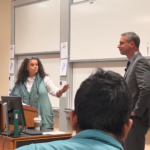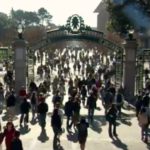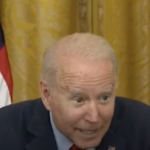Save the Farm
A library featuring the personal papers of anti-communist hero Whittaker Chambers is being planned on the site of his farm in Maryland. Unfortunately, local authorities are considering a water project that could damage part of the property. Chambers’ son John is asking for help to save the farm. Time is of the essence.
Whittaker Chambers blew the whistle on the Communist penetration of our government and exposed Soviet spy Alger Hiss. Hiss became the first acting secretary-general of the United Nations, causing it to be dubbed “the house that Hiss built” He also advised President Franklin Roosevelt at the Yalta conference, which defined post-World War II Europe and betrayed Eastern European nations to Soviet control.
The farm is the scene of the famous pumpkin patch where the “pumpkin papers” had been hidden by Chambers before being turned over to the House Committee on un-American Activities. The “papers” were actually microfilm copies of secret and stolen State Department documents given to Chambers by Hiss for transmission to the Soviet Union. They constituted absolute proof of Hiss’s guilt. The patch today is part of the lawn.
The Whittaker Chambers farm, located in Westminster, Maryland, in Carroll County, was declared a national historic landmark under the Reagan Administration and President Reagan posthumously bestowed the Presidential Medal of Freedom on Chambers.
But county authorities are planning a water project that could interfere with and harm the property.
The Carroll County Commission (Maryland) should be contacted and respectfully asked to change their plans to flood or harm any portion of the Whittaker Chambers farm. Please send all comments on the draft Water Resources Element to Carroll County Commission, Att. Brenda Dinne, by e-mail to bdinne@ccg.carr.org or by mail to 225 North Center Street, Room 204, Westminster, MD 21157.
The Freedom and Historic Preservation Foundation is leading the effort to save the farm and deserves our support.
Chambers’ son John Chambers, who now owns the property, told me during a visit that he had started a process to build a library and catalogue the papers, now in boxes and stacks in various locations. He said he has turned down offers from universities interested in acquiring some of the papers because he wants to make sure all of them are displayed and open to the public.
Photos of the property, including the famous location of the pumpkin patch, can be viewed in my special report.
The location, not too far outside of Washington, D.C. could serve to educate the public about the importance of the Hiss case and the battle against communism. My 2007 AIM column on the significance of the farm quoted various experts as saying that a library housing Whittaker Chambers’ personal papers had tremendous potential as an educational resource.
The case gripped the nation after the end of World War II and Chambers’ charges that top State Department official Alger Hiss was a communist and Soviet spy were proven in court. Chambers went on to write Witness, which not only described the details of the case and his effort to tell the truth about communist penetration of the highest levels of the U.S. Government, but served as a basis for the establishment of the modern conservative movement. Chambers maintained that the nation’s only hope of surviving was in maintaining its spiritual foundation, belief in God, and commitment to freedom.
Chambers passed away in 1961. Hiss died in 1996.
While the “pumpkin papers” are remembered as the most direct evidence of the communist penetration of the U.S. Government, Chambers himself wrote that the evidence could also be seen in the policies adopted by the government under the influence of Soviet agents. He wrote, “In the persons of Alger Hiss and Harry Dexter White, the Soviet military intelligence sat close to the heart of the United States Government.” He called it “a situation with few parallels in history” in which “the agents of an enemy power were in a position to do much more than purloin documents. They were in a position to influence the nation’s foreign policy in the interests of the nation’s chief enemy…” Chambers said “That power to influence policy had always been the ultimate purpose of the Communist Party’s infiltration.”
Chambers emphasized in his book Witness that these secret communists not only served the interests of the Soviet Union but had promoted the triumph of communism in China.
John Chambers told me during my visit that he considers himself a farmer, not a political person, and doesn’t want to spend his time fighting attempts by the county commissioners to seize part of his farmland in order to build a dam and a lake for development purposes. He vowed never to give up that fight.
Now he needs our help.
John recalled being about 13-years-old and joining his father for an appearance on NBC’s “Meet the Press.” John Chambers sat in the small studio audience and his father was grilled by journalists about his charges against Hiss. In Witness, a young John Chambers is quoted as later saying, “Papa, why did those men hate you so?”
Witness was a major influence on President Ronald Reagan, who resisted the advance of Soviet communism, especially in Central America, and laid the groundwork for the collapse of the “evil empire.”
Reagan invoked the name of Whittaker Chambers in remarks delivered on March 8, 1983, saying that he believed that communism was “another sad, bizarre chapter in human history whose last pages even now are being written.”
Tragically, however, communism is still in control and solidifying its grip in China, and a new form of communism associated with Hugo Chavez of Venezuela has gained strength in various countries in Latin America.
The need for the Whittaker Chambers library can be seen in President Obama’s decision as a candidate to select Anthony Lake as a foreign policy adviser. By the time that Obama had picked him, Lake had become a laughingstock for expressing doubts as to whether Alger Hiss was a communist spy. Lake didn’t go into the administration, however, and remained a professor at Georgetown University, where he teaches diplomacy to U.S. students and grooms them to be Foreign Service officers.
Cliff Kincaid is the Editor of Accuracy in Media, and can be contacted at cliff.kincaid@aim.org. This is an excerpt of one of his columns, which can be read in its entirety here.




